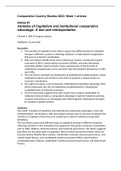Comparative Country Studies 2023: Week 1 articles
Article #1
Varieties of Capitalism and institutional comparative
advantage: A test and reinterpretation
Michael A. Witt & Gregory Jackson
Published: 22 July 2016
Key points:
1. The Varieties of Capitalism (VoC) theory argues that different types of capitalism
emerge in different countries, reflecting variations in institutional arrangements
that govern economic coordination.
2. Witt and Jackson identify three main institutional clusters: coordinated market
economies (CMEs), mixed market economies (MMEs), and state-led market
economies (SMEs), which provide a more nuanced view of the diversity of
institutional arrangements across countries than the simplistic dichotomy of LMEs
and CMEs.
3. The VoC theory overlooks the importance of institutional complementarity, where
institutions interact and reinforce each other to produce a unique system of
economic coordination.
4. The authors propose a new framework, institutional comparative advantage (ICA),
which emphasizes the role of institutional complementarity in shaping the
competitiveness of national economies.
5. The ICA framework suggests that each country has a unique combination of
institutions that provides a comparative advantage in specific industries and that
countries should focus on developing and reinforcing their institutional strengths
to compete in global markets.
Summary:
The article "Varieties of Capitalism and institutional comparative advantage: A test and
reinterpretation" by Michael A. Witt and Gregory Jackson aims to test and reinterpret the
Varieties of Capitalism (VoC) theory by analyzing its empirical validity and potential
limitations.
The VoC theory argues that different types of capitalism emerge in different countries,
reflecting variations in the institutional arrangements that govern economic coordination,
such as labor relations, financial systems, and corporate governance. The theory suggests
that there are two ideal types of capitalism: liberal market economies (LMEs), which are
characterized by flexible labor markets, shareholder-oriented corporate governance, and
market-based finance, and coordinated market economies (CMEs), which feature
coordinated labor relations, stakeholder-oriented corporate governance, and bank-based
finance.
, Witt and Jackson analyze data from 27 countries and find that the VoC theory does not
fully capture the diversity of institutional arrangements across countries. They identify
three main institutional clusters: CMEs, which are characterized by coordinated labor
relations and bank-based finance; mixed market economies (MMEs), which exhibit a
combination of LME and CME features; and state-led market economies (SMEs), which
have strong government intervention in the economy and corporate governance.
Moreover, they argue that the VoC theory overlooks the importance of institutional
complementarity, that is, the idea that institutions interact and reinforce each other to
produce a unique system of economic coordination. They propose a new framework,
institutional comparative advantage (ICA), which emphasizes the role of institutional
complementarity in shaping the competitiveness of national economies.
The ICA framework suggests that each country has a unique combination of institutions
that provides a comparative advantage in specific industries. Countries should focus on
developing and reinforcing their institutional strengths to compete in global markets.
In conclusion, Witt and Jackson's analysis highlights the need to go beyond the simplistic
dichotomy of LMEs and CMEs proposed by the VoC theory and to consider the diversity
and complementarity of institutional arrangements across countries. Their proposed ICA
framework provides a more nuanced and dynamic approach to understanding the
relationship between institutions, economic coordination, and competitiveness.
Overall conclusion:
Varieties of Capitalism (VoC) theory provides a useful starting point for understanding the
diversity of institutional arrangements across countries, but it has limitations. Specifically,
the VoC theory oversimplifies the institutional landscape by only considering two ideal
types of capitalism and ignoring the importance of institutional complementarity. The
authors propose a new framework, institutional comparative advantage (ICA), which
emphasizes the role of institutional complementarity in shaping the competitiveness of
national economies. The ICA framework suggests that each country has a unique
combination of institutions that provides a comparative advantage in specific industries
and that countries should focus on developing and reinforcing their institutional strengths
to compete in global markets. Overall, the authors argue that a more nuanced and
dynamic approach is needed to understand the relationship between institutions,
economic coordination, and competitiveness.





